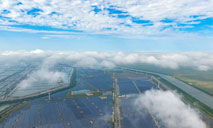China's water diversion project promotes green development
ZHENGZHOU, May 14 (Xinhua) -- Xi Jinping, general secretary of the Communist Party of China Central Committee, on Thursday inspected the South-to-North Water Diversion Project in the city of Nanyang in central China's Henan Province.
On Thursday afternoon, he went to the county of Xichuan, where he inspected the Taocha Canal Head, Danjiangkou Reservoir and village of Zouzhuang. Xi listened to the introductions of the construction, management and operation of the middle route of the water diversion project and the ecological conservation of the water source region.
When the water started to gush north through the middle route in December 2014, Xi, also Chinese president and chairman of the Central Military Commission, described the South-to-North Water Diversion Project as an important strategic infrastructure to optimize water resources, boost sustainable economic and social development and improve people's livelihoods.
Six years on, the middle route of the water diversion project, which takes water from Danjiangkou in the middle reaches of the Yangtze, to feed the arid north including Beijing, Tianjin, and the provinces of Henan and Hebei, has proved to be a reliable "lifeline" for water supplies in the recipient regions.
As of March, the mega water project had transferred over 40.8 billion cubic meters of water to the northern areas. More than 130 million people had directly benefited from the project since the first phase of its eastern and middle routes began supplying water.
More than 40 big and medium-sized cities received water from the project, which has also helped ecological restoration of rivers and lakes along its eastern and middle routes.
GREENER NORTH
Major water plants in Beijing have used the supply from the water diversion project in addition to that from Miyun Reservoir in the northeast of the city to provide tap water.
Zhang Ying, a resident in Daxing District, southern Beijing, said local people had to buy purified water for drinking in the past, because of excessive levels of scale-formation in tap water.
"Now the tap water has become clearer and the flow has become bigger," she said.
According to the Beijing Water Authority, the supply of the water diversion project has replenished rivers and lakes.
"The ecological environment around the Miyun Reservoir has been greatly improved, and the species of aquatic animals and plants have increased substantially," said Liu Dagen, director of the reservoir management office.
The water diversion project has also promoted the ecological protection and green development in the source area and along the routes.
In Xichuan County, 380 polluting companies have been shut down to ensure the safety of the water source for the diversion project. The county has invested more than 600 million yuan (93.24 billion U.S. dollars) in the treatment of industrial waste. Catering, fishing and animal husbandry business have been banned in reservoir and river areas.
There are 13 automatic water quality monitoring stations along the middle route. Underwater robots are widely used for monitoring aquatic organism and sediment levels, and checking water gates.
Trees are planted within 100 meters on both sides of the diversion canal in Henan, meandering about 640 km. The afforestation along the canal has formed an ecological zone for water conservation. A section of the canal-side green belt in Jiaozuo City, Henan, has recently been opened as a public eco-park.
Meanwhile, the country has been increasing the awareness of water conservation among citizens.
Zhao Tan, director of the water-saving office of the Beijing Water Authority, said despite the water replenished by the water diversion project, the capital still faces severe water shortage, with the per capita available water resources at about 150 cubic meters.
He said the city has basically realized the collection and treatment of sewage in urban areas. Recycled water has become an indispensable water source in the capital city.
Photos
Related Stories
- Xi visits resettled residents of China's mega water diversion project
- Xi Jinping on China's water diversion project, water conservation
- In pics: water-diversion project in Fujian
- China to highlight green development in its future progress
- North China's Inner Mongolia sees notable achievements in green development
Copyright © 2021 People's Daily Online. All Rights Reserved.










